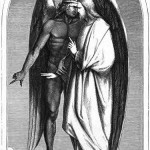We run our website the way we wished the whole internet worked: we provide high quality original content with no ads. We are funded solely by your direct support. Please consider supporting this project.

When Jesus Referred to Canaanites as “Dogs”
Last week I discussed Paul’s harsh language regarding his opponents, the worst example being his reference to certain opponents as “dogs” (Phil 3:2). I suggested that such language simply reflects the fact that Paul wasn’t perfect, as he himself admitted. Several people pushed back on this suggestion by pointing out that Jesus once referred to Canaanites as “dogs.” If Paul’s reference reflects his imperfection, doesn’t the same apply to Jesus? Today I will explain why I think it does not.
This strange episode is found in Matthew 15:21-28. Here we find a Canaanite woman pleading with Jesus to free her demonized daughter (v. 22). Jesus initially ignored her and his disciples urged him to send her away (v. 23). Despite this, and despite the fact that Jesus reminded her that Jews looked down on Canaanites as “dogs” (v.26), the lady persisted. As a result, Jesus praised this woman’s “great faith” and then granted her request (v. 28).
Now, some NT scholars who don’t accept the biblical witness to Jesus’ sinless nature (Heb 4:15) argue that this episode indicates that Jesus shared his Jewish culture’s racist view of Canaanites. And if Jesus actually intended his comment to disparage the Canaanites, I see no way of avoiding their conclusion. Moreover, since racism is a sin, we would have to consider the biblical claim that Jesus was sinless to be mistaken. On the other hand, if we accept that Jesus was without sin, we simply cannot believe Jesus intended his remark to disparage Canaanites. And in this case, it is incumbent upon us to explain what Jesus did intend by his remark.
To discern what Jesus was up to, we need to recall that Jesus was a descendant of King David (Matt 1:6), the paradigmatic, mighty warrior king at the height of Israel’s glory. We need to remember as well that the name “Jesus” is the Greek version of “Joshua” in Hebrew. In this light, some have argued that this exchange between the contemporary “Joshua” and a descendent of those whom the ancient Joshua attempted to exterminate suggests that Matthew intends this story to be read against the background of the conquest narrative.
Read in this light, it becomes apparent that by extending mercy to a descendent of the people whom the ancient Joshua had shown no mercy, this contemporary Joshua is subverting the “show no mercy” command of the conquest narrative. Hence, Philip Jenkins argues, in this exchange the story of the attempted annihilation of the Canaanites “comes full circle, and the extermination order is repealed” (Laying Down the Sword [HarperOne, 2011], 241).
This interpretation helps explain why Jesus tested the woman’s faith by bringing up the Jewish stereotype of Canaanites as “dogs,” which was itself part of the legacy of the conquest narrative. Engaging in what some have called “prophetic theater,” Jesus dramatically exposed the racial hostility that lingered from the violent conquest in order to dramatically reveal that faith in his barrier-crossing mercy overcomes this hostility and frees people from its demonic oppression.
In short, Jesus was role-playing when he referred to Canaanites as “dogs,” and he was doing this with the loving motive of freeing people from the racist curse that had persisted since Joshua’s bloody conquest of the land of Canaan. I can frankly see no similar motive at work in Paul’s disparaging reference to his theological opponents, which is why I conclude that Paul’s reference to “dogs” reflects his imperfection while Jesus’ reference does not.
Photo on VisualHunt
Category: General
Tags: Bible Interpretation, Cruciform Theology, Paul Copan
Related Reading

Overemphasizing Christ?
In response to my work, some have argued that I tend to overemphasize Christ. In light of the claim that in Jesus we have the one and only definitive Word of God and that no previous revelation should ever be placed alongside him or allowed to qualify what he reveals about God, some allege that…

Christ-Centered or Cross-Centered?
The Christocentric Movement Thanks largely to the work of Karl Barth, we have over the last half-century witnessed an increasing number of theologians advocating some form of a Christ-centered (or, to use a fancier theological term, a “Christocentric”) theology. Never has this Christocentric clamor a been louder than right now. There are a plethora of…

Who is Responsible for Job’s Suffering?
In the prologue of the Book of Job, the author seems to ascribe the responsibility for Job’s affliction to Yahweh. For instance, Satan challenges God to “stretch out [his] hand and strike everything he has,“ believing that this would incite Job to curse God to his face (1:11). The fact that the Lord responds by…

Eye for Eye: That Time Jesus Refuted An Old Testament Teaching
One of the most surprising aspects of Jesus’ teaching is that, while he clearly shared his contemporaries’ view of the Old Testament as inspired by God, he was nevertheless not afraid of repudiating it when he felt led by his Father to do so (Jn. 8:28; 12:49-50; 14:31). For example, while the OT commands people…

What Does Spiritual Warfare Have To Do with the Cross?
Last week, we covered a few posts on the nature of the Atonement and the Christus Victor view. The following continues this theme, specifically looking the motif of spiritual warfare and how it relates to Christ’s work on the cross. This is an adaptation from Greg’s article in The Nature of the Atonement: Four Views. …

The Cruciform Center Part 2: How John’s Gospel Reveals a Cruciform God
In the previous post, we looked at how the Synoptics illustrate the centrality of the cross. While the Gospel of John varies in its structure and language from the Synoptics, the cross remains at the center. This centrality is expressed in a number of different ways. 1. The role that Jesus’ death plays in glorifying…
